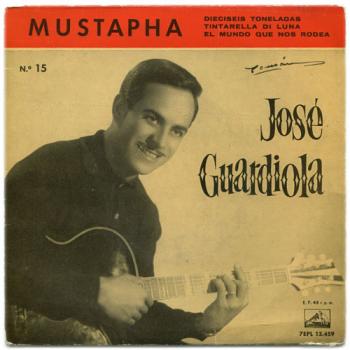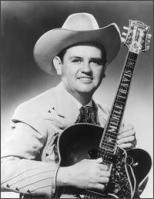Some people say a man is made out of mud
A poor man's made out of muscle and blood
Muscle and blood, skin and bones...
A mind that's weak and a back that's strong
You load sixteen tons, and what do you get?
another day older and deeper in debt
St. Peter, don't you call me, 'cause I can't go
I owe my soul to the company store
I was born one mornin' and the sun didn't shine
I picked up my shovel and I walked to the mine
I loaded sixteen tons of number nine coal and
the straw boss said, "well bless my soul!"
.....you loaded...
You load sixteen tons, and what do you get?
another day older and deeper in debt
St. Peter, don't you call me, 'cause I can't go
I owe my soul to the company store
I was born one mornin' it was drizzlin' rain
fightin' and trouble are my middle name
I was raised in a cane-brake by an old mama lion
can't no high-toned woman make me walk no line
You load sixteen tons, and what do you get?
another day older and deeper in debt
St. Peter, don't you call me, 'cause I can't go
I owe my soul to the company store
If you see me comin', better step aside
A lot of men didn't, a lot of men died
One fist of iron, the other of steel
If the right one don't get you, then the left one will
You load sixteen tons, and what do you get?
another day older and deeper in debt
St. Peter, don't you call me, 'cause I can't go
I owe my soul to the company store
You load sixteen tons, and what do you get?
Another day older and deeper in debt
St. Peter don't you call me, 'cause I can't go
I owe my soul to the company store
A poor man's made out of muscle and blood
Muscle and blood, skin and bones...
A mind that's weak and a back that's strong
You load sixteen tons, and what do you get?
another day older and deeper in debt
St. Peter, don't you call me, 'cause I can't go
I owe my soul to the company store
I was born one mornin' and the sun didn't shine
I picked up my shovel and I walked to the mine
I loaded sixteen tons of number nine coal and
the straw boss said, "well bless my soul!"
.....you loaded...
You load sixteen tons, and what do you get?
another day older and deeper in debt
St. Peter, don't you call me, 'cause I can't go
I owe my soul to the company store
I was born one mornin' it was drizzlin' rain
fightin' and trouble are my middle name
I was raised in a cane-brake by an old mama lion
can't no high-toned woman make me walk no line
You load sixteen tons, and what do you get?
another day older and deeper in debt
St. Peter, don't you call me, 'cause I can't go
I owe my soul to the company store
If you see me comin', better step aside
A lot of men didn't, a lot of men died
One fist of iron, the other of steel
If the right one don't get you, then the left one will
You load sixteen tons, and what do you get?
another day older and deeper in debt
St. Peter, don't you call me, 'cause I can't go
I owe my soul to the company store
You load sixteen tons, and what do you get?
Another day older and deeper in debt
St. Peter don't you call me, 'cause I can't go
I owe my soul to the company store
Contributed by Alessandro - 2010/2/8 - 14:38
Language: Italian
Scopro su Musica & Memoria che Adriano Celentano ne fece una cover (scritta da Beretta-Del Prete) inclusa nell'album "Adriano Rock" del 1968... Celentano riprenderà questa canzone anni dopo (nel 1984) con un testo completamente diverso, metaforico, dal titolo "L'ascensore".
MISERIA NERA
Miseria nera
Nel mondo d'oro
Mattina e sera
Io cerco lavoro
Ho buone braccia da adoperare
Son quattro le bocche
Che in casa mi chiedono da mangiare.
Io vendo il cuore
Lo vendo, per non morire
La vita è bella,
Ma è bella per pochi
E non per me.
Da muratore
In fonderia
Poi minatore
E così via
Con queste mani
Non so rubare
E batto la porta di tutti chiedendo
Da lavorare.
Io vendo il cuore
Lo vendo, per non morire
La vita è bella,
Ma è bella per pochi
E non per me.
Miseria nera
Nel mondo d'oro
Mattina e sera
Io cerco lavoro
Ho buone braccia da adoperare
Son quattro le bocche
Che in casa mi chiedono da mangiare.
Io vendo il cuore
Lo vendo, per non morire
La vita è bella,
Ma è bella per pochi
E non per me.
Miseria nera
Nel mondo d'oro
Mattina e sera
Io cerco lavoro
Ho buone braccia da adoperare
Son quattro le bocche
Che in casa mi chiedono da mangiare.
Io vendo il cuore
Lo vendo, per non morire
La vita è bella,
Ma è bella per pochi
E non per me.
Da muratore
In fonderia
Poi minatore
E così via
Con queste mani
Non so rubare
E batto la porta di tutti chiedendo
Da lavorare.
Io vendo il cuore
Lo vendo, per non morire
La vita è bella,
Ma è bella per pochi
E non per me.
Miseria nera
Nel mondo d'oro
Mattina e sera
Io cerco lavoro
Ho buone braccia da adoperare
Son quattro le bocche
Che in casa mi chiedono da mangiare.
Io vendo il cuore
Lo vendo, per non morire
La vita è bella,
Ma è bella per pochi
E non per me.
Contributed by Alessandro - 2010/2/11 - 13:20
Language: Italian
Traduzione italiana di Michele Murino della versione cantata da Bob Dylan, da Maggie's Farm.
16 TONS
Sono nato una mattina che il sole non splendeva
Raccolsi una pala e me ne andai alla miniera
Caricai sedici tonnellate di carbone
E il caposquadra mi disse: "Bene, che Dio mi benedica"
Hai caricato sedici tonnellate, e cosa hai ottenuto?
Sei più vecchio di un giorno e più indebitato
San Pietro non mi chiamare perchè non posso andare
La mia anima la devo dare alla compagnia mineraria
Hai caricato sedici tonnellate, e cosa hai ottenuto?
Sei più vecchio di un giorno e più indebitato
San Pietro non mi chiamare perchè non posso andare
La mia anima la devo dare alla compagnia mineraria
Sono nato una mattina che la pioggia cadeva leggera
Di secondo nome faccio Guai e Lotta
Una vecchia leonessa mi ha cresciuto in un canneto
E non c'è donna per quanto di alto rango che mi possa far rigare dritto
Hai caricato sedici tonnellate, e cosa hai ottenuto?
Sei più vecchio di un giorno e più indebitato
San Pietro non mi chiamare perchè non posso andare
La mia anima la devo dare alla compagnia mineraria
Quando mi vedi arrivare è meglio che ti sposti
Un sacco di gente non l'ha fatto ed un sacco ne è morta
Ho un pugno di ferro, l'altro invece è di acciaio
E se non ti becco con il destro lo farò col sinistro
Hai caricato sedici tonnellate, e cosa hai ottenuto?
Sei più vecchio di un giorno e più indebitato
San Pietro non mi chiamare perchè non posso andare
La mia anima la devo dare alla compagnia mineraria
Sono nato una mattina che il sole non splendeva
Raccolsi una pala e me ne andai alla miniera
Caricai sedici tonnellate di carbone
E il caposquadra mi disse: "Bene, che Dio mi benedica"
Hai caricato sedici tonnellate, e cosa hai ottenuto?
Sei più vecchio di un giorno e più indebitato
San Pietro non mi chiamare perchè non posso andare
La mia anima la devo dare alla compagnia mineraria.
Sono nato una mattina che il sole non splendeva
Raccolsi una pala e me ne andai alla miniera
Caricai sedici tonnellate di carbone
E il caposquadra mi disse: "Bene, che Dio mi benedica"
Hai caricato sedici tonnellate, e cosa hai ottenuto?
Sei più vecchio di un giorno e più indebitato
San Pietro non mi chiamare perchè non posso andare
La mia anima la devo dare alla compagnia mineraria
Hai caricato sedici tonnellate, e cosa hai ottenuto?
Sei più vecchio di un giorno e più indebitato
San Pietro non mi chiamare perchè non posso andare
La mia anima la devo dare alla compagnia mineraria
Sono nato una mattina che la pioggia cadeva leggera
Di secondo nome faccio Guai e Lotta
Una vecchia leonessa mi ha cresciuto in un canneto
E non c'è donna per quanto di alto rango che mi possa far rigare dritto
Hai caricato sedici tonnellate, e cosa hai ottenuto?
Sei più vecchio di un giorno e più indebitato
San Pietro non mi chiamare perchè non posso andare
La mia anima la devo dare alla compagnia mineraria
Quando mi vedi arrivare è meglio che ti sposti
Un sacco di gente non l'ha fatto ed un sacco ne è morta
Ho un pugno di ferro, l'altro invece è di acciaio
E se non ti becco con il destro lo farò col sinistro
Hai caricato sedici tonnellate, e cosa hai ottenuto?
Sei più vecchio di un giorno e più indebitato
San Pietro non mi chiamare perchè non posso andare
La mia anima la devo dare alla compagnia mineraria
Sono nato una mattina che il sole non splendeva
Raccolsi una pala e me ne andai alla miniera
Caricai sedici tonnellate di carbone
E il caposquadra mi disse: "Bene, che Dio mi benedica"
Hai caricato sedici tonnellate, e cosa hai ottenuto?
Sei più vecchio di un giorno e più indebitato
San Pietro non mi chiamare perchè non posso andare
La mia anima la devo dare alla compagnia mineraria.
Contributed by Bartleby - 2012/2/10 - 09:14
Language: French
Traduction française....
Tirée du blog : les monophonies de de Polyphrène
Impossible de commencer à parler de Merle Travis sans citer, au moins, "Sixteen Tons", chanson emblématique et parfaitement représentative de son génie et de ses racines.
La forme d'esclavage que constituait la technique des sociétés minières, sous une apparence de pratique sociale, de s'attacher les travailleurs en leur fournissant à crédit le minimum vital, de sorte que leur dette augmentait peu à peu et qu'il ne pouvaient la rembourser qu'en prolongeant toujours plus leur contrat aux conditions imposées par l'employeur, reçoit un nouvel éclairage aujourd'hui :
Dans les pays pauvres (ou"en voie de développement, comme on dit pudiquement"), cette pratique est encore courante et enchaîne littéralement les personnes les plus démunies à leur employeur, tandis que, dans les pays riches, la pratique du crédit facile a précipité des millions de famille dans la pauvreté, et menace maintenant le fragile équilibre mondial.
Tirée du blog : les monophonies de de Polyphrène
Impossible de commencer à parler de Merle Travis sans citer, au moins, "Sixteen Tons", chanson emblématique et parfaitement représentative de son génie et de ses racines.
La forme d'esclavage que constituait la technique des sociétés minières, sous une apparence de pratique sociale, de s'attacher les travailleurs en leur fournissant à crédit le minimum vital, de sorte que leur dette augmentait peu à peu et qu'il ne pouvaient la rembourser qu'en prolongeant toujours plus leur contrat aux conditions imposées par l'employeur, reçoit un nouvel éclairage aujourd'hui :
Dans les pays pauvres (ou"en voie de développement, comme on dit pudiquement"), cette pratique est encore courante et enchaîne littéralement les personnes les plus démunies à leur employeur, tandis que, dans les pays riches, la pratique du crédit facile a précipité des millions de famille dans la pauvreté, et menace maintenant le fragile équilibre mondial.
Tes Seize Tonnes
Tu charges tes seize tonnes, et qu’est-ce que tu en tires ?
Encore plus de dettes, un jour en moins de vie !
Saint-Pierre soyez patient, je n’peux pas venir,
Mon âme appartient à la Compagnie
Les gens disent que l’homme a été fait d’argile
Mais un pauvre homme est fait de sang, muscle et bile
Muscles et sang, os et peau
Un petit cerveau mais un dos costaud
Tu charges tes seize tonnes, et qu’est-ce que tu en tires ?
Encore plus de dettes, un jour en moins de vie !
Saint-Pierre soyez patient, je n’peux pas venir,
Mon âme appartient à la Compagnie
Je suis né de nuit sous un ciel sans étoiles
J’ai marché vers la mine et ramassé ma pelle
J’ai chargé dix-huit tonnes de gros charbon
Le contre-maître a dit « Oh, nom de nom »
Tu charges tes seize tonnes, et qu’est-ce que tu en tires ?
Encore plus de dettes, un jour en moins de vie !
Saint-Pierre soyez patient, je n’peux pas venir,
Mon âme appartient à la Compagnie
Je suis né un matin sous une petite pluie fine
Querelle et trouble sont mes deux prénoms
Élevé dans la meute au fond de la mine
Je suis féroce comme un loup, mais doux comme un mouton
Tu charges tes seize tonnes, et qu’est-ce que tu en tires ?
Encore plus de dettes, un jour en moins de vie !
Saint-Pierre soyez patient, je n’peux pas venir,
Mon âme appartient à la Compagnie
Mieux vaudrait t’écarter si tu me vois venir
Celui qui ne le fait pas s’apprête à périr
J’ai un poing de fer et l’autre d’acier
Si tu échappes au gauche, le droit va te tuer
Tu charges tes seize tonnes, et qu’est-ce que tu en tires ?
Encore plus de dettes, un jour en moins de vie !
Saint-Pierre soyez patient, je n’peux pas venir,
Mon âme appartient à la Compagnie
Tu charges tes seize tonnes, et qu’est-ce que tu en tires ?
Encore plus de dettes, un jour en moins de vie !
Saint-Pierre soyez patient, je n’peux pas venir,
Mon âme appartient à la Compagnie
Les gens disent que l’homme a été fait d’argile
Mais un pauvre homme est fait de sang, muscle et bile
Muscles et sang, os et peau
Un petit cerveau mais un dos costaud
Tu charges tes seize tonnes, et qu’est-ce que tu en tires ?
Encore plus de dettes, un jour en moins de vie !
Saint-Pierre soyez patient, je n’peux pas venir,
Mon âme appartient à la Compagnie
Je suis né de nuit sous un ciel sans étoiles
J’ai marché vers la mine et ramassé ma pelle
J’ai chargé dix-huit tonnes de gros charbon
Le contre-maître a dit « Oh, nom de nom »
Tu charges tes seize tonnes, et qu’est-ce que tu en tires ?
Encore plus de dettes, un jour en moins de vie !
Saint-Pierre soyez patient, je n’peux pas venir,
Mon âme appartient à la Compagnie
Je suis né un matin sous une petite pluie fine
Querelle et trouble sont mes deux prénoms
Élevé dans la meute au fond de la mine
Je suis féroce comme un loup, mais doux comme un mouton
Tu charges tes seize tonnes, et qu’est-ce que tu en tires ?
Encore plus de dettes, un jour en moins de vie !
Saint-Pierre soyez patient, je n’peux pas venir,
Mon âme appartient à la Compagnie
Mieux vaudrait t’écarter si tu me vois venir
Celui qui ne le fait pas s’apprête à périr
J’ai un poing de fer et l’autre d’acier
Si tu échappes au gauche, le droit va te tuer
Tu charges tes seize tonnes, et qu’est-ce que tu en tires ?
Encore plus de dettes, un jour en moins de vie !
Saint-Pierre soyez patient, je n’peux pas venir,
Mon âme appartient à la Compagnie
Contributed by Marco Valdo M.I. - 2012/2/10 - 10:24
Language: French
Version française – SEIZE TONNES – Jean Bertola – 1957
Chanson étazunienne – Sixteen Tons – Merle Travis - 1947
Si la chanson Sixteen Tons est une chanson étazunienne, de Merle Travis (1947), elle fut adaptée en français par Jacques Larue et reprise par une série d'interprètes, dont Jean Bertola – jeune à l'époque. On relève des versions d'Armand Mestral, des Quatres de Paris, John William...
Juste un mot pour dire le succès de cette chanson à l'époque où le charbon était l'énergie première et où l'Europe était peuplée de millions de mineurs... et certaines régions couvertes de chevalets, de terrils et de charbonnages. Tout cela presque disparu, à présent. Le mineur, dans nos régions, n'est plus fort présent...
Sic transit.
Ainsi Parlait Marco Valdo M.I.
Chanson étazunienne – Sixteen Tons – Merle Travis - 1947
Si la chanson Sixteen Tons est une chanson étazunienne, de Merle Travis (1947), elle fut adaptée en français par Jacques Larue et reprise par une série d'interprètes, dont Jean Bertola – jeune à l'époque. On relève des versions d'Armand Mestral, des Quatres de Paris, John William...
Juste un mot pour dire le succès de cette chanson à l'époque où le charbon était l'énergie première et où l'Europe était peuplée de millions de mineurs... et certaines régions couvertes de chevalets, de terrils et de charbonnages. Tout cela presque disparu, à présent. Le mineur, dans nos régions, n'est plus fort présent...
Sic transit.
Ainsi Parlait Marco Valdo M.I.
SEIZE TONNES
Si l'homme est de la boue pour des tas de gens
Il est pour moi fait de chair et de sang
De muscles de fer, de cœur trop bon
Avec deux épaules pour charger le charbon
T'en fais seize tonnes, ça te donne quoi ?
Un jour de plus vers quatre planches de bois
La pelle chaque jour qui prend plus de poids
Mais qui ferait vivre la mine sans toi ?
Quand ta mère a déjà cinq gosses à nourrir
Un de plus n'est pas pour lui faire plaisir
Alors toi, tu bosses comme un lion
Mais le chef a beau dire que tu es un champion
T'en fais seize tonnes, ça te donne quoi ?
Un jour de plus vers quatre planches de bois
La crasse qui te ronge et durcit tes doigts
Et le droit de te taire quand tu touches ton mois
À force de te battre comme un damné
L’envie te prend d’envoyer tout promener
Mais il y a tous les rêves de tes copains
Alors, tu la boucles, mais tu serres les poings
T'en fais seize tonnes, ça te donne quoi ?
Un jour de plus vers quatre planches de bois
Et, pour te consoler de voir ce que tu vois
Il y a l’idée que ton père l’a vu avant toi
Mais, si toute la semaine, tu crèves en bas
Le dimanche, enfin, tout le ciel est à toi
Et dans tes draps blancs, dès ton réveil,
Les yeux de ta femme sont comme deux soleils
T'en fais seize tonnes, ça te donne quoi ?
Un jour quand même où tu peux croire à la joie
L’espoir d’une autre vie pour tes deux petits gars
Et toute la mine qui pense comme toi
Si l'homme est de la boue pour des tas de gens
Il est pour moi fait de chair et de sang
De muscles de fer, de cœur trop bon
Avec deux épaules pour charger le charbon
T'en fais seize tonnes, ça te donne quoi ?
Un jour de plus vers quatre planches de bois
La pelle chaque jour qui prend plus de poids
Mais qui ferait vivre la mine sans toi ?
Quand ta mère a déjà cinq gosses à nourrir
Un de plus n'est pas pour lui faire plaisir
Alors toi, tu bosses comme un lion
Mais le chef a beau dire que tu es un champion
T'en fais seize tonnes, ça te donne quoi ?
Un jour de plus vers quatre planches de bois
La crasse qui te ronge et durcit tes doigts
Et le droit de te taire quand tu touches ton mois
À force de te battre comme un damné
L’envie te prend d’envoyer tout promener
Mais il y a tous les rêves de tes copains
Alors, tu la boucles, mais tu serres les poings
T'en fais seize tonnes, ça te donne quoi ?
Un jour de plus vers quatre planches de bois
Et, pour te consoler de voir ce que tu vois
Il y a l’idée que ton père l’a vu avant toi
Mais, si toute la semaine, tu crèves en bas
Le dimanche, enfin, tout le ciel est à toi
Et dans tes draps blancs, dès ton réveil,
Les yeux de ta femme sont comme deux soleils
T'en fais seize tonnes, ça te donne quoi ?
Un jour quand même où tu peux croire à la joie
L’espoir d’une autre vie pour tes deux petits gars
Et toute la mine qui pense comme toi
Contributed by Marco Valdo M.I. - 2012/2/10 - 10:40
Language: Spanish
Versione spagnola di José Guardiola (1930-2012), cantante catalano.
Da un EP del 1960

José Guardiola fu costretto dalla censura a cantare le ultime due strofe in inglese, perché il significato fosse meno comprensibile…
Da un EP del 1960

José Guardiola fu costretto dalla censura a cantare le ultime due strofe in inglese, perché il significato fosse meno comprensibile…
DIECISÉIS TONELADAS
Yo soy un pobre paria, minero soy,
con mi azadón y mi pala nací,
y un día gris, sin aurora y sin sol,
dispuesto a luchar a la mina fui.
Cargar sixteen tons y descargar
es tu misión, viejo, hay que aguantar;
tu recompensa, pobre John, la tendrás
cuando hecho polvo descansarás ya.
Ya desde que apunta el sol me debo al control,
y soy para el capataz un número más;
mi nombre es inquietud y preocupación,
pero suelen llamarme "Polea John".
Cargar sixteen tons y descargar
es tu misión, viejo, hay que aguantar;
tu recompensa, pobre John, la tendrás
cuando hecho polvo descansarás ya.
Fue tu vida negra y dura, pobre John,
tal vez dirán los que verán mi funeral
y el jefe dirá: fue un valiente corazón
luchando hasta el final.
Cargar sixteen tons y descargar
es tu misión, viejo, hay que aguantar;
tu recompensa, pobre John, la tendrás
cuando hecho polvo descansarás ya.
[If you see me comin', better step aside
A lotta men didn't, a lotta men died.
One fist of iron, the other of steel
If the right one don't a-get you, then the left one will]
Si me ves venir, mejor será que te hagas a un lado
Muchos hombres no lo hicieron, muchos hombres murieron
Un puño de hierro, el otro de acero
Si el derecho no te alcanza, entonces lo hará el izquierdo
[You load sixteen tons, what do you get?
Another day older and deeper in debt
Saint Peter don't you call me 'cause I can't go
I owe my soul to the company store]
Cargas dieciséis toneladas, y ¿qué consigues?
Otro día más viejo y más hundido en las deudas
San Pedro no me llames porque no puedo ir
Le debo el alma al almacén de la compañía
Yo soy un pobre paria, minero soy,
con mi azadón y mi pala nací,
y un día gris, sin aurora y sin sol,
dispuesto a luchar a la mina fui.
Cargar sixteen tons y descargar
es tu misión, viejo, hay que aguantar;
tu recompensa, pobre John, la tendrás
cuando hecho polvo descansarás ya.
Ya desde que apunta el sol me debo al control,
y soy para el capataz un número más;
mi nombre es inquietud y preocupación,
pero suelen llamarme "Polea John".
Cargar sixteen tons y descargar
es tu misión, viejo, hay que aguantar;
tu recompensa, pobre John, la tendrás
cuando hecho polvo descansarás ya.
Fue tu vida negra y dura, pobre John,
tal vez dirán los que verán mi funeral
y el jefe dirá: fue un valiente corazón
luchando hasta el final.
Cargar sixteen tons y descargar
es tu misión, viejo, hay que aguantar;
tu recompensa, pobre John, la tendrás
cuando hecho polvo descansarás ya.
[If you see me comin', better step aside
A lotta men didn't, a lotta men died.
One fist of iron, the other of steel
If the right one don't a-get you, then the left one will]
Si me ves venir, mejor será que te hagas a un lado
Muchos hombres no lo hicieron, muchos hombres murieron
Un puño de hierro, el otro de acero
Si el derecho no te alcanza, entonces lo hará el izquierdo
[You load sixteen tons, what do you get?
Another day older and deeper in debt
Saint Peter don't you call me 'cause I can't go
I owe my soul to the company store]
Cargas dieciséis toneladas, y ¿qué consigues?
Otro día más viejo y más hundido en las deudas
San Pedro no me llames porque no puedo ir
Le debo el alma al almacén de la compañía
Contributed by Bernart - 2013/5/20 - 16:55
Une floppée de versions :
Armand Mestral : https://www.youtube.com/watch?v=EgsnlzEHOCI
Sixteen Tons :
Adriano Celentano (italien): https://www.youtube.com/watch?v=QYdMDfWtaWI
Lou Monte, version napolitaine - Versione neapoletana (1961) : https://www.youtube.com/watch?v=enj3pvkomPs
The Platters : https://www.youtube.com/watch?v=RIBoPsThloE
The Golden Gate Quartett - The sixteen tonnes (live in France, 1964) :https://www.youtube.com/watch?v=QCoZsxoDQUE
Rockacapella : https://www.youtube.com/watch?v=Lvrs2baGtl0
Tennesse Ernie Ford (1955) sans doute l'originale :
https://www.youtube.com/watch?v=1K0l-xPhWzs
Ajoutée le 14 sept. 2013
"Sixteen Tons" is a song about the life of a coal miner, first recorded in 1946 by American country singer Merle Travis and released on his box set album Folk Songs of the Hills the following year. A 1955 version recorded by Tennessee Ernie Ford reached number one in the Billboard charts, while another version by Frankie Laine was released only in Western Europe, where it gave Ford's version competition.
While the song is usually attributed to Merle Travis, to whom it is credited on his 1946 recording, George S. Davis, a folk singer and songwriter who had been a Kentucky coal miner, claimed on a 1966 recording for Folkways Records to have written the song as "Nine-to-ten tons" in the 1930s. Davis' recording of his version of the song appears on the albums George Davis: When Kentucky Had No Union Men and Classic Mountain Songs from Smithsonian.
According to Travis, the line from the chorus, "another day older and deeper in debt", was a phrase often used by his father, a coal miner himself. This and the line, "I owe my soul to the company store", is a reference to the truck system and to debt bondage. Under this scrip system, workers were not paid cash; rather they were paid with non-transferable credit vouchers which could be exchanged only for goods sold at the company store. This made it impossible for workers to store up cash savings. Workers also usually lived in company-owned dormitories or houses, the rent for which was automatically deducted from their pay. In the United States the truck system and associated debt bondage persisted until the strikes of the newly formed United Mine Workers and affiliated unions forced an end to such practices.
Tennesse Ernie Ford (1956) https://www.youtube.com/watch?v=Joo90ZWrUkU
Tennesse Ernie Ford – version Gogo – 1965 : https://www.youtube.com/watch?v=92arUrGVt6k
Johnny Cash : https://www.youtube.com/watch?v=tfp2O9ADwGk
Jeff Beck and ZZ Top - Ernie Ford's SIXTEEN TONS - https://www.youtube.com/watch?v=J2aqvKY6zLc
Sixteen Tons – Merle Travis – 1947 – L'original :
https://www.youtube.com/watch?v=5pfVvqLM_e4
et aussi, https://www.youtube.com/watch?v=3I15_KUsOzs
Yessir, there's a-many a Kentucky coal miner that pretty near owes his soul to the company store. He gets so far in debt to the coal company he's a-workin' fer that he goes on fer years without being paid one red cent in real honest-to-goodness money. But he can always go to the company store and draw flickers or scrip -- you know, that's little brass coins that you can't spend nowhere only at the company store. So they add that against his account and every day he gets a little farther in debt. That sounds pretty bad, but even that's got a brighter side to it.
Big Bill Broonzy - Sixteen Tons - https://www.youtube.com/watch?v=8ynBUIjzPpI
Choeurs de l'Armée Rouge (un incunable) : https://www.youtube.com/watch?v=dI9KBLb_8ro
Armand Mestral : https://www.youtube.com/watch?v=EgsnlzEHOCI
Sixteen Tons :
Adriano Celentano (italien): https://www.youtube.com/watch?v=QYdMDfWtaWI
Lou Monte, version napolitaine - Versione neapoletana (1961) : https://www.youtube.com/watch?v=enj3pvkomPs
The Platters : https://www.youtube.com/watch?v=RIBoPsThloE
The Golden Gate Quartett - The sixteen tonnes (live in France, 1964) :https://www.youtube.com/watch?v=QCoZsxoDQUE
Rockacapella : https://www.youtube.com/watch?v=Lvrs2baGtl0
Tennesse Ernie Ford (1955) sans doute l'originale :
https://www.youtube.com/watch?v=1K0l-xPhWzs
Ajoutée le 14 sept. 2013
"Sixteen Tons" is a song about the life of a coal miner, first recorded in 1946 by American country singer Merle Travis and released on his box set album Folk Songs of the Hills the following year. A 1955 version recorded by Tennessee Ernie Ford reached number one in the Billboard charts, while another version by Frankie Laine was released only in Western Europe, where it gave Ford's version competition.
While the song is usually attributed to Merle Travis, to whom it is credited on his 1946 recording, George S. Davis, a folk singer and songwriter who had been a Kentucky coal miner, claimed on a 1966 recording for Folkways Records to have written the song as "Nine-to-ten tons" in the 1930s. Davis' recording of his version of the song appears on the albums George Davis: When Kentucky Had No Union Men and Classic Mountain Songs from Smithsonian.
According to Travis, the line from the chorus, "another day older and deeper in debt", was a phrase often used by his father, a coal miner himself. This and the line, "I owe my soul to the company store", is a reference to the truck system and to debt bondage. Under this scrip system, workers were not paid cash; rather they were paid with non-transferable credit vouchers which could be exchanged only for goods sold at the company store. This made it impossible for workers to store up cash savings. Workers also usually lived in company-owned dormitories or houses, the rent for which was automatically deducted from their pay. In the United States the truck system and associated debt bondage persisted until the strikes of the newly formed United Mine Workers and affiliated unions forced an end to such practices.
Tennesse Ernie Ford (1956) https://www.youtube.com/watch?v=Joo90ZWrUkU
Tennesse Ernie Ford – version Gogo – 1965 : https://www.youtube.com/watch?v=92arUrGVt6k
Johnny Cash : https://www.youtube.com/watch?v=tfp2O9ADwGk
Jeff Beck and ZZ Top - Ernie Ford's SIXTEEN TONS - https://www.youtube.com/watch?v=J2aqvKY6zLc
Sixteen Tons – Merle Travis – 1947 – L'original :
https://www.youtube.com/watch?v=5pfVvqLM_e4
et aussi, https://www.youtube.com/watch?v=3I15_KUsOzs
Yessir, there's a-many a Kentucky coal miner that pretty near owes his soul to the company store. He gets so far in debt to the coal company he's a-workin' fer that he goes on fer years without being paid one red cent in real honest-to-goodness money. But he can always go to the company store and draw flickers or scrip -- you know, that's little brass coins that you can't spend nowhere only at the company store. So they add that against his account and every day he gets a little farther in debt. That sounds pretty bad, but even that's got a brighter side to it.
Big Bill Broonzy - Sixteen Tons - https://www.youtube.com/watch?v=8ynBUIjzPpI
Choeurs de l'Armée Rouge (un incunable) : https://www.youtube.com/watch?v=dI9KBLb_8ro
Lucien Lane - 2015/11/22 - 10:46
Secondo me Miseria nera non è la cover di questo brano.
Tanto più che nei credits è citato il solo autore italiano delle musiche, Gino Santercole, e nessun altro.
L'unica cover di Celentano dovrebbe essere quindi "L'Ascensore"
Tanto più che nei credits è citato il solo autore italiano delle musiche, Gino Santercole, e nessun altro.
L'unica cover di Celentano dovrebbe essere quindi "L'Ascensore"
Maurizio Sereni - 2017/5/15 - 07:22
Ho riascoltato "Miseria nera" di Celentano e anche secondo me ha ragione Maurizio Sereni: non è una cover di "Sixteen Tons".
Però i crediti sono a Gino Santercole, Luciano Beretta e Miki Del Prete.
Forse andrebbe creata una pagina autonoma per "Miseria nera"...
Però i crediti sono a Gino Santercole, Luciano Beretta e Miki Del Prete.
Forse andrebbe creata una pagina autonoma per "Miseria nera"...
Bernart Bartleby - 2017/5/15 - 11:15
krzyś - 2017/5/15 - 11:49
krzyś - 2017/5/15 - 11:52
Language: Sardinian
B'at zente asut'e terra cada die traballande
Sun homines de sàmbene sa vida gherrande
Su cùcuru ‘e sos depidos 'che tocat in chelu
Sos pessamentos mudan su sonnu in disvelu
E tando bim bam bò
Miseru chi so
Ca so truncàndemi s'ischina e m'assimizo a unu boe
Santu Predu, no mi mutas chi no potho artziare
Ca s'ànima apo bèndidu a su printzipale
Sa die chi so naschidu deo su sole fit bambu
E sos frores poberitos mi parian chene cambu
Deo chin sa pala in manu ispalande sa miniera
De biver cun sa morte imparo sa manera
E tando bim bam bò
Miseru chi so
Ca so truncàndemi s'ischina e m'assimizo a unu boe
Santu Predu, no mi mutas chi no potho artziare
Ca s'ànima apo bèndidu a su printzipale
Sa die chi so naschidu deo fit rusinande
Iscuru fit su chelu e su bentu rulande
Ap'ispalau crabone dae sa die 'e su batizu
Gai cantat sa cantone de miniera unu fizu
E tando bim bam bò
Miseru chi so
Ca so truncàndemi s'ischina e m'assimizo a unu boe
Santu Predu, no mi mutas chi no potho artziare
Ca s'ànima apo bèndidu a su printzipale
Sun homines de sàmbene sa vida gherrande
Su cùcuru ‘e sos depidos 'che tocat in chelu
Sos pessamentos mudan su sonnu in disvelu
E tando bim bam bò
Miseru chi so
Ca so truncàndemi s'ischina e m'assimizo a unu boe
Santu Predu, no mi mutas chi no potho artziare
Ca s'ànima apo bèndidu a su printzipale
Sa die chi so naschidu deo su sole fit bambu
E sos frores poberitos mi parian chene cambu
Deo chin sa pala in manu ispalande sa miniera
De biver cun sa morte imparo sa manera
E tando bim bam bò
Miseru chi so
Ca so truncàndemi s'ischina e m'assimizo a unu boe
Santu Predu, no mi mutas chi no potho artziare
Ca s'ànima apo bèndidu a su printzipale
Sa die chi so naschidu deo fit rusinande
Iscuru fit su chelu e su bentu rulande
Ap'ispalau crabone dae sa die 'e su batizu
Gai cantat sa cantone de miniera unu fizu
E tando bim bam bò
Miseru chi so
Ca so truncàndemi s'ischina e m'assimizo a unu boe
Santu Predu, no mi mutas chi no potho artziare
Ca s'ànima apo bèndidu a su printzipale
Contributed by adriana - 2019/6/6 - 08:56
×
![]()
Note for non-Italian users: Sorry, though the interface of this website is translated into English, most commentaries and biographies are in Italian and/or in other languages like French, German, Spanish, Russian etc.









Album “Folk Songs of the Hills” (1947)
Canzone resa celebre nelle interpretazioni di Tennessee Ernie Ford (1955) e poi di Francesco Paolo LoVecchio (beh, questo era il vero nome del grande Frankie Lane).
Racconta della dura vita del minatore di carbone, che si spezza la schiena dall’alba al tramonto e che nemmeno può concedersi il lusso di morire perché “pieno di debiti, ha venduto l’anima alla compagnia mineraria”. Infatti, nonostante le decine di grandi e sanguinosi scioperi organizzati dalla United Mine Workers of America specie nei primi due decenni del 20° secolo, in molte miniere le compagnie non pagavano i lavoratori in denaro corrente ma in assegni o buoni illegali che essi erano costretti a spendere, spesso indebitandosi, negli spacci gestiti dalle stesse compagnie, che così da datrici di lavoro diventavano creditrici e quindi “proprietarie” della forza lavoro alle loro dipendenze. Questo cosiddetto “debt bondage” o “truck system”, nei paesi di lingua spagnola viene chiamato con un sostantivo che rende ancor meglio l’idea: “enganche”.